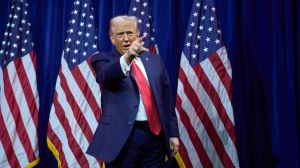PM8217;S US trip may ring in more reforms
NEW DELHI, SEPTEMBER 4: In a bid to woo US investors, the government is likely to advance the date for completely freeing up the internati...

NEW DELHI, SEPTEMBER 4: In a bid to woo US investors, the government is likely to advance the date for completely freeing up the international long distance telecom market, and announce this prior to Prime Minister Atal Bihari Vajpayee8217;s visit. The state-owned Videsh Sanchar Nigam Limited8217;s VSNL monopoly on international long distance traffic was set to end in 2004, but the Cabinet will decide on advancing this tomorrow, and work out a suitable compensation for VSNL.
Dismantling VSNL8217;s monopoly has been a major demand of US telecom firms, and the government is keen to send out positive signals prior to Vajpayee8217;s visit. Just a few days ago, the government had announced the corporatisation of the Department of Telecom Services, and had allowed 100 percent foreign investment in areas like voice mail, internet, and laying of dark telecom fibre. And last month, the government had opened up domestic long distance telecom traffic to private players.
For consumers, this is great news as costs of international calls could fall as much as 30 to 40 per cent immediately. How expensive international calls from India are can be seen from the fact that while a call from India to the US costs Rs 61.20 per minute, the same call from the US to India costs as little as Rs 20. The difference can broadly be considered to be monopoly costs/profits. With the sector opened up, costs are expected to fall dramatically.
The government has already sought legal opinion on the matter which states that it has the right to modify the licence of VSNL at any given time, provided a 8220;reasonable notice period8221; is given to the company before this is actually done.
Views of the Law Ministry, Ministry of External Affairs as this involves bilateral negotiations with countries in deciding accounting rates and Ministry of Commerce in order to be in line with WTO commitments have also been sought on the issue.
According to senior government sources, this 8220;reasonable8221; period may be of around three to six months. The Department of Telecommunications was earlier considering a time frame for dismantling the VSNL monopoly by 2002 8212; VSNL8217;s license expires on 31/3/2004, though 8212; but with the PM8217;s impending visit to the US, there is considerable pressure to advance this date as well.
With National Long Distance NLD having been opened up last month, the government is now veering around to the view that even International Long Distance ILD should be opened up.
There is also some degree of nervousness on the success of the NLD policy announced last month as two-and-a-half weeks after the policy was unveiled, not a single company has approached the government to grant it a licence for NLD operations. Government circles believe that if ILD is also opened, it may revive interest in the long distance market.
In return for the dismantling of VSNL8217;s monopoly, the government is likely to offer the company a compensation package. This package may include allowing VSNL to participate in other areas of telecom and also giving it a cash compensation. VSNL has been keen to enter areas such as basic services, upgradation of its internet licence ISP from the present six-city licence to an All-India licence.
Says a senior VSNL official: 8220;If the government opens up our monopoly area for other companies to come in, it is only fair that even VSNL is allowed to diversify into other telecom areas. Otherwise, it would be like tying up our hands and feet and throwing us into the deep end of the sea without a fair chance of survival.8221;
While the Cabinet may decide on the issue of opening up of the ILD first, the actual compensation package for VSNL may be worked out later. In the meantime, the see-saw on which the VSNL stocks perform in the share markets can be any body8217;s guess. It may be recalled, the VSNL was listed only last month on the New York Stock Exchange NYSE without any change in its licence, and if the government now decides to open up the ILD turf for free competition, VSNL8217;s stocks are sure to react sharply.
- 01
- 02
- 03
- 04
- 05































